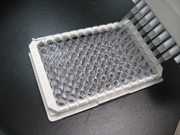Glycogen is a polysaccharide found in animals that consists of glucose monomers and serves as the primary method for storing glucose. Glycogen is synthesized in the liver and muscles and found in smaller quantities in the kidney, glial cells, and white blood cells. Disruption in glycogen metabolism can lead to various disorders, such as glycogen storage disease, low blood sugar, changes in liver size, and glycogen brancher deficiency.
Our Glycogen Assay Kits measure glycogen in serum, plasma, urine, lysates, and cell culture supernatants. First, glycogen is broken down into glucose monomers by amyloglucosidase. Glucose is then oxidized by glucose oxidase, producing D-gluconic acid and hydrogen peroxide. The hydrogen peroxide reacts specifically with the kit’s Probe and is detected with either a standard microplate reader (colorimetric format) or a fluorescence plate reader (fluorometric format). Glycogen levels in unknown samples are determined based on the provided glycogen standard curve.
